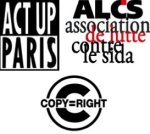Home > International > Middle Income Countries, the new target for Big Pharma : ALCS Morocco & (…)
Act Up-Paris & ALCS-Maroc
 Middle Income Countries, the new target for Big Pharma : ALCS Morocco & Act Up-Paris call on concerned countries to issue compulsory licencing without delay
Middle Income Countries, the new target for Big Pharma : ALCS Morocco & Act Up-Paris call on concerned countries to issue compulsory licencing without delay
Wednesday 3 August 2011
All the versions of this article: [English] [français]
Casablanca • Paris — A report released by MSF two weeks ago shows that the main pharmaceutical companies that hold most of the patents on medications used against HIV/AIDS are suspending their standardized "access" programs in Middle-Income Countries (MICs). Many of those countries are also becoming ineligible to the Global Fund to Fight AIDS, Tuberculosis and Malaria. Once again, Merck, Johnson & Johnson and GSK (ViiV Healthcare) sacrifice the lives of people living with the diseases for their own profits. Companies must publish now the full list of their prices drug by drug and country by country.
And concerned countries must without delay use their right to issue Compulsory Licenses (CLs), to break patents and to produce or import generics copies of these patented drugs.
• Merck, J&J & ViiV are taking one more step in their murderers cynicism by ending "access" pricing for Middle Income countries•
MSF report ‘Untangling the Web of ARV Price Reductions’ [1], published for the world’s largest scientific conference on HIV/AIDS in Rome draws the conclusion that Middle-Income countries are massively concerned by the suspension of standardized ‘access programs’ by major drug manufacturers.
This report shows the increase of 23 antiretroviral prices based on informations provided by 19 medicine suppliers. A Press release from MSF [2] summarizes the shut down of these prices reduction programs company by company and drug by drug : Tibotec (J&J) exludes all the Middle-Income countries from standardised reduced price ; ViiV (GSK and Pfizer) has stopped standardised price reductions in MICS, even when the medicines are fully paid by the Global Fund to Fight AIDS, TB and Malaria ; Abbott excludes several Middle-Income countries from standardised reduced price reductions for one of its medications. Merck, who has just launched its new drug Raltegravir, stopped its standardized discount program in 49 countries, including several countries that are the most hit by HIV/AIDS, including India, Thailand, and the Ukraine.
Merck pretends that it does not exclude these countries. However, the company requires these countries to negotiate the price for the drugs on a case by case basis, without any transparency, which can lead to very high prices, sometimes close to prices in West Europe and North America.
The company’s communication is not credible and can hardly hide their murdererous cynicism.
Interruption of this standardized program for middle income countries reinforces what we have already known for years - since the "Accelerating Access" program began 10 years ago; these so-called access programs are not sustainable, because they can be stopped by pharma cold turkey, be different country per country and pressure countries to take ‘advantage’ of the program rather than using generic copies and flexibilities of TRIPS. Also, as there is no transparency for the negotiation of the prices, a drug companie can impose whatever prices it want.
ALCS-Morocco and Act Up-Paris ask pharmaceutical companies to release the full list of their drug prices country per country.
• Middle Income Countries, the new target for Big Pharma •
Three weeks ago, the pharmaceutical firm Gilead announced having reached a deal with UNITAID Medicine Patent Pool [3]
. Within the Patent Pool, most of Middle-Income countries, including countries from Middle East/North Africa (MENA) region have been excluded.
The only reason that Pharmaceutical Companies excluded these countries from their standardized ‘access’ programs and Patent Pool deal is so they can dominate the market in these countries. Thousands will die as a result.
Moreover, in 2011, the richest countries have refused to significantly increase their contribution to the Global Fund to Fight AIDS, Tuberculosis and Malaria. They pushed for a reform of Global Fund’s governance that has made most of these countries ineligible to Global Fund’s grants ; in less than a year, these countries have been excluded from essential resources, and must pay for more expensive medications.
"Morocco is one of the country that will not benefit from a significant drop of prices, while people living with HIV cannot afford to pay for these ARVs at the prices sold in Europe. Meanwhile, the government cannot afford to make these treatments available to all who need." said Pr. Hakima Himmich, President of ALCS-Morocco. "Many countries of the Middle-East/North Africa Region are in the same situation, even while MENA is the region in the world where the number of people living with HIV on treatment is the lowest in the world."
"It is time for countries to use the flexibilities of WTO agreements on IP (TRIPS)" said Ms. Pauline Londeix, spoke-person for Act Up-Paris. "If these flexibilities that are supposed to make possible for every single country to produce or import cheaper drugs continue to be so little used, at some point the international community will have to revise TRIPS to reflect the fact that the European Union and the United States and their pharmaceutical companies are preventing CLs from being issued. The reality in countries is that people are still dying, massively, every day."
In response to firms’ politics that endanger the life to people living with the disease, governments have to issue Compulsory Licenses without delay, as the international laws allow them to, break the patents, and import or produce generic copies of drugs. This issue of revising TRIPS has to be brought up urgently.
[3] Cf. ITPC MENA & Act Up-Paris’s Press statements :
http://www.itpcmena.org/spip.php?article212 &
http://www.actupparis.org/spip.php?article4617
 Act Up-Paris
Act Up-Paris